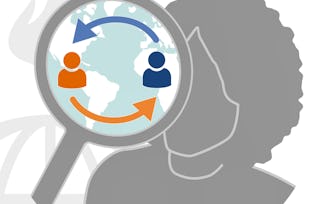Intended for students who have completed the introduction to health equity research course and/or have previous experience working in this area. This course will cover innovative methods, practical tools, and skills required to conduct rigorous health equity research and translate evidence-based strategies into practice and policy. Covers topics ranging from conceptual frameworks for stakeholder engagement and behavioral intervention development, to adapting interventions for socially-at-risk populations, and research methods in healthcare services and social epidemiology.

Application of Health Equity Research Methods for Practice and Policy

Application of Health Equity Research Methods for Practice and Policy


Instructors: Lisa A. Cooper, M.D.
3,351 already enrolled
Included with
43 reviews
What you'll learn
Apply or develop conceptual frameworks for stakeholder engagement or behavioral interventions.
Describe methods used to develop or adapt appropriate assessment and intervention materials for certain socially-at-risk populations.
Apply innovative recruitment strategies for socially at-risk populations, including hiring and training staff for health equity research studies.
Identify methods and measures in social epidemiology and health services research and sources of data that can be utilized research.
Skills you'll gain
Details to know

Add to your LinkedIn profile
5 assignments
See how employees at top companies are mastering in-demand skills

There are 5 modules in this course
This module provides as an introduction to the course. In this module, we discuss designing multi-level interventions to close the implementation gap in health equity research.
What's included
10 videos2 readings1 assignment1 discussion prompt1 plugin
In this module, we discuss how social epidemiology can be used to inform the development of health equity interventions.
What's included
5 videos1 reading1 assignment1 discussion prompt
In this module, we discuss the use of health services research methods to inform health equity interventions.
What's included
5 videos1 reading1 assignment1 discussion prompt
In this module, we describe how to tailor assessment and intervention materials for socially-at-risk populations. We provide examples of how to adapt materials for populations with limited health literacy and populations with limited English proficiency.
What's included
13 videos1 reading1 assignment2 discussion prompts
In this module, we discuss multiple considerations in implementing health equity research. The first is strategies to increase diversity in research participation. The second is hiring and training staff to conduct health equity research.
What's included
6 videos1 reading1 assignment1 discussion prompt
Instructors


Offered by
Explore more from Public Health
 Status: Preview
Status: PreviewJohns Hopkins University
 Status: Preview
Status: PreviewJohns Hopkins University
 Status: Free Trial
Status: Free TrialUniversity of Michigan
 Status: Free Trial
Status: Free Trial
Why people choose Coursera for their career

Felipe M.

Jennifer J.

Larry W.

Chaitanya A.
Learner reviews
- 5 stars
83.72%
- 4 stars
13.95%
- 3 stars
0%
- 2 stars
2.32%
- 1 star
0%
Showing 3 of 43
Reviewed on Sep 3, 2021
Excellent course, the instructors are very deailed and concise. I look forward to applying heath Equity reserach methods into study design strategy &implementation.
Reviewed on Mar 25, 2021
I would really appreciate it if I had this opportunity to benefit from this practical course entitled "Application of Health Equity Research Methods".
Reviewed on Mar 9, 2021
I enjoyed the comprehensive approach to research including hiring a research staff.

Open new doors with Coursera Plus
Unlimited access to 10,000+ world-class courses, hands-on projects, and job-ready certificate programs - all included in your subscription
Advance your career with an online degree
Earn a degree from world-class universities - 100% online
Join over 3,400 global companies that choose Coursera for Business
Upskill your employees to excel in the digital economy
Frequently asked questions
To access the course materials, assignments and to earn a Certificate, you will need to purchase the Certificate experience when you enroll in a course. You can try a Free Trial instead, or apply for Financial Aid. The course may offer 'Full Course, No Certificate' instead. This option lets you see all course materials, submit required assessments, and get a final grade. This also means that you will not be able to purchase a Certificate experience.
When you purchase a Certificate you get access to all course materials, including graded assignments. Upon completing the course, your electronic Certificate will be added to your Accomplishments page - from there, you can print your Certificate or add it to your LinkedIn profile.
Yes. In select learning programs, you can apply for financial aid or a scholarship if you can’t afford the enrollment fee. If fin aid or scholarship is available for your learning program selection, you’ll find a link to apply on the description page.
More questions
Financial aid available,

